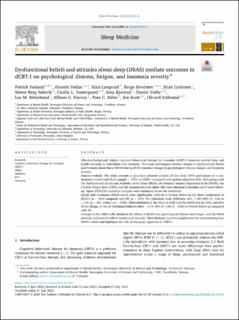| dc.contributor.author | Faaland, Patrick | |
| dc.contributor.author | Vedaa, Øystein | |
| dc.contributor.author | Langsrud, Knut | |
| dc.contributor.author | Sivertsen, Børge | |
| dc.contributor.author | Lydersen, Stian | |
| dc.contributor.author | Saksvik, Simen Berg | |
| dc.contributor.author | Vestergaard, Cecilie Lund | |
| dc.contributor.author | Kjørstad, Kaia | |
| dc.contributor.author | Vethe, Daniel | |
| dc.contributor.author | Ritterband, Lee M. | |
| dc.contributor.author | Harvey, Allison G. | |
| dc.contributor.author | Stiles, Tore Charles | |
| dc.contributor.author | Scott, Janine Linda | |
| dc.contributor.author | Kallestad, Håvard | |
| dc.date.accessioned | 2023-11-09T14:10:18Z | |
| dc.date.available | 2023-11-09T14:10:18Z | |
| dc.date.created | 2023-08-30T11:35:58Z | |
| dc.date.issued | 2023 | |
| dc.identifier.citation | Sleep Medicine. 2023, 110 1-6. | en_US |
| dc.identifier.issn | 1389-9457 | |
| dc.identifier.uri | https://hdl.handle.net/11250/3101715 | |
| dc.description.abstract | Objective/background
Digital cognitive behavioral therapy for insomnia (dCBT-I) improves several sleep and health outcomes in individuals with insomnia. This study investigates whether changes in Dysfunctional Beliefs and Attitudes about Sleep (DBAS) during dCBT-I mediate changes in psychological distress, fatigue, and insomnia severity.
Patients/methods
The study presents a secondary planned analysis of data from 1073 participants in a randomized control trial (Total sample = 1721) of dCBT-I compared with patient education (PE). Self-ratings with the Dysfunctional Beliefs and Attitudes about Sleep (DBAS), the Hospital Anxiety Depression Scale (HADS), the Chalder Fatigue Scale (CFQ), and the Insomnia Severity Index (ISI) were obtained at baseline and 9-week follow-up. Hayes PROCESS mediation analyses were conducted to test for mediation.
Results and conclusion
sDBAS scores were significantly reduced at 9-week follow-up for those randomized to dCBT-I (n = 566) compared with PE (n = 507). The estimated mean difference was −1.49 (95% CI -1.66 to −1.31, p < .001, Cohen's d. = 0.93). DBAS mediated all the effect of dCBT-I on the HADS and the CFQ, and 64% of the change on the ISI (Estimated indirect effect −3.14, 95% CI -3.60 to −2.68) at 9-week follow-up compared with PE.
Changes in the DBAS fully mediated the effects of dCBT-I on psychological distress and fatigue, and the DBAS partially mediated the effects on insomnia severity. These findings may have implications for understanding how dCBT-I works and highlights the role of changing cognitions in dCBT-I. | en_US |
| dc.language.iso | eng | en_US |
| dc.publisher | Elsevier | en_US |
| dc.rights | Navngivelse 4.0 Internasjonal | * |
| dc.rights.uri | http://creativecommons.org/licenses/by/4.0/deed.no | * |
| dc.title | Dysfunctional beliefs and attitudes about sleep (DBAS) mediate outcomes in dCBT-I on psychological distress, fatigue, and insomnia severity | en_US |
| dc.type | Peer reviewed | en_US |
| dc.type | Journal article | en_US |
| dc.description.version | publishedVersion | en_US |
| dc.source.pagenumber | 1-6 | en_US |
| dc.source.volume | 110 | en_US |
| dc.source.journal | Sleep Medicine | en_US |
| dc.identifier.doi | 10.1016/j.sleep.2023.07.018 | |
| dc.identifier.cristin | 2170875 | |
| dc.relation.project | Norges forskningsråd: 239985 | en_US |
| dc.relation.project | Helse Midt-Norge: 90061500 | en_US |
| cristin.ispublished | true | |
| cristin.fulltext | original | |
| cristin.qualitycode | 1 | |

